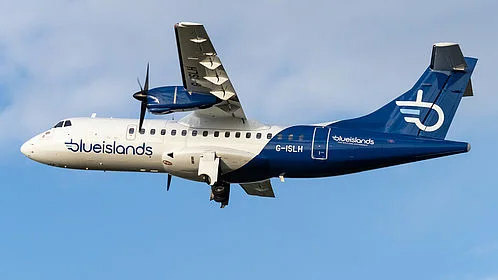Alright, let's cut the corporate BS. Blue Islands, gone. Poof. Just like that, another regional airline bites the dust, leaving a hundred people out of a job and God knows how many passengers scrambling. But here’s the thing: are we really supposed to clutch our pearls and act shocked? Because from where I’m sitting, this ain’t exactly a plot twist in a Bret Michaels reality show. This was less a sudden collapse and more like watching a zombie shuffle along for years before finally, mercifully, dropping dead.
They suspended trading on a Friday evening, effective immediately. Convenient, isn't it? Gives everyone a nice weekend to stew in the chaos. Four flights out of Southampton cancelled Saturday morning—Jersey, Guernsey. Imagine that scene: tired folks showing up, luggage in hand, only to see the dreaded "CANCELLED" flash on the screen. No frantic dash to a gate; just a quiet, sinking feeling. I bet you could almost hear the collective sigh of resignation echoing through the terminal, like a bad track on repeat. And what's the official word? "Deeply regret the inconvenience." Give me a break. That’s the corporate equivalent of "oopsie." It’s a phrase designed to sound empathetic while meaning absolutely nothing. This wasn't an inconvenience; it was a gut punch to people's travel plans, their wallets, and for the staff, their livelihoods.
Now, let’s talk about the elephant in the room, or rather, the £8.5 million elephant in the balance sheet. The Government of Jersey, bless their cotton socks, decided to loan Blue Islands a hefty sum during the good ol' Covid days to "secure its services." Fast forward to August 2025, and guess what? £7 million of that loan is still outstanding. More than halfway through the loan period, and they're still holding the bag. This isn't just a business failure; it’s a government-backed, taxpayer-funded failure.
Are we supposed to believe that nobody saw this coming? That a company still owing millions in a government loan was on solid ground? It’s like pouring water into a leaky bucket and pretending it’s full. And now, Jersey’s Minister for Treasury and Resources, Elaine Millar, is expressing "sadness" and talking about "government support" for affected employees. That's rich. They supported the company right into the ground, and now they're going to support the people who lost their jobs because of it. It’s a vicious cycle, isn't it? The government steps in, props up a failing entity, and when it inevitably collapses—because you can't defy gravity forever—they pat themselves on the back for being there to pick up the pieces. Why do we keep falling for this same old song and dance? Are we just that gullible, or is it that nobody in power actually learns anything?

And here's another kicker: Blue Islands ain't the first. This is the second regional carrier to flatline in less than three weeks, right after Eastern Airways went kaput on October 28. An aviation analyst even called it out: "second airline in weeks to stop flying in the UK, impacting smaller airports across southern England." This isn't a fluke; it's a trend. It's the regional aviation sector looking like a game of Jenga where someone keeps pulling out the crucial blocks. They talk about ensuring "reliable and sustainable air links for the long-term," but what does that even mean when we just saw another one crash and burn like a cheap firework... and the one before that?
But hey, don't worry your pretty little heads! Loganair, the "rescue" airline, swooped in faster than a seagull on a dropped chip. New flights starting Sunday, "rescue fares" of £80 one-way, even covering the essential medical route between Southampton and Jersey. They're even setting up a new permanent operating base in Jersey and "encouraging former Blue Islands staff to apply." Isn't that just peachy?
It's almost too neat, isn't it? One airline collapses, another one immediately steps in, grabs the routes, and even gets the staff, likely at a lower cost. It’s like a corporate predator waiting for a wounded gazelle to fall before moving in for the kill. I'm not saying Loganair is evil, but let’s be real, this isn't charity. This is smart business, capitalizing on a competitor's demise. It's the Darwinian law of the corporate jungle, plain and simple. Aurigny, Guernsey's airline, also laid on extra flights. Everyone's scrambling to fill the void, which just proves how vital these routes were. Yet, the original operator, the one that supposedly provided "vital year-round links" for nearly two decades, couldn't make it work. Maybe the links were vital, but the business model, not so much.
This whole saga is just another chapter in the endless book of corporate failures, dressed up with polite apologies and "rescue" missions. We're told to feel sad, but honestly, it’s more frustrating than anything else. When a company relies on government handouts to stay afloat, and then still can't hack it, that's not a tragedy. That's a predictable outcome. It’s a stark reminder that sometimes, no matter how much you try to prop up a failing enterprise, the market—or simple economics—will always have the final say.